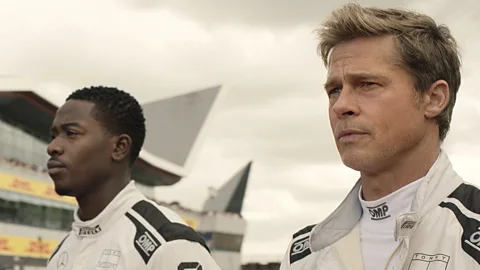 Apple TV+/ F1
Apple TV+/ F1Brad Pitt plays a long-in-the-tooth former Formula One star in a “slick and shiny” new summer popcorn film from the team behind Top Gun: Maverick.
Brad Pitt’s character in F1, Sonny Hayes, has had a tough time. As shown in de-aged and big-wigged flashbacks, he used to be the golden boy of Formula One, but he was in a horrific crash 30 years ago that tore his life to pieces. He lost his career, he went on to have several failed marriages and quite a few ill-advised tattoos, and now he trundles from one less-than-glamorous racing event to another in his camper van, when he isn’t gambling or driving a cab for money. Luckily for him, his old buddy Ruben (Javier Bardem) is in charge of a Formula One team that keeps losing, so he hands Sonny a plane ticket to England, and begs him to compete at motor-racing’s top level once again.
This, you might think, could be a tall order. Sonny could be a bit rusty, a bit out of touch with Formula One’s latest developments. He might even have some fears and doubts relating to the traumatic crash that ruined his life. But no. One of the problems with F1, the slick and shiny new summer popcorn film from director Joseph Kosinski and the rest of the team behind Top Gun: Maverick excluding Tom Cruise, is that Sonny has made a full psychological and physical recovery before the opening scene. His flaws are fixed, his demons are dead, and now he has no weaknesses at all except the laidback arrogance which is only to be expected of someone who looks like Brad Pitt. From the moment he moseys into Silverstone in his double denim and his Once Upon a Time in Hollywood shades, Sonny is supremely relaxed and confident, and he soon proves to be a tactical genius, an inspiring leader, a loyal team player, a gentlemanly charmer, and an innovative car designer, as well as the kind of irreverent dude who does card tricks during important meetings and doesn’t care about trophies or money. The film’s big question is why this superhero ever left Formula One in the first place.
It’s fun to hang out with such a charismatic rogue, of course, but it’s hard to be emotionally involved when the hero’s journey takes him all the way from “great guy but slightly cocky” to “great guy but slightly less cocky”. The biggest issue with F1, though, is not its insistence on showing its leading man in a flattering light, but its equivalent, fawning attitude towards Formula One itself. Shot on real circuits with the full co-operation of the organisers and participants (Lewis Hamilton is credited as a producer), it’s essentially a glossy corporate promotional film with so much distracting product placement that you’re more likely to remember the brand names than the characters. There is no wisp of criticism or scepticism, and no hint of anything exploitative or sleazy. Formula One fans may be pleased by the glimpses of their favourite drivers, but F1 is so intent on being positive about its milieu that none of these men is allowed to be a proper antagonist, or even to say anything rude about Sonny. Nobody can misbehave, and nothing terrible can happen to any of the characters, so there is no tension to speak of. The story simply hops around the world, ticking off every Grand Prix in a season. In the first of these, Ruben’s team fails miserably, but as the weeks go by… well, if you scribbled down what you guessed the structure might be, you’d be absolutely correct – except that your version might have some more high-stakes jeopardy than the actual film.
F1
Director: Joseph Kosinski
Cast: Brad Pitt, Damson Idris, Javier Bardem, Kerry Condon
It’s not that F1 is poorly made. It’s not a car crash, so to speak. As Top Gun: Maverick demonstrated, Kosinski and his collaborators now how to shoot and edit terrific sequences focused on high-speed vehicles. Hans Zimmer, the composer, provides some epic synth anthems to slot in between the usual classic rock staples (Queen’s We Will Rock You, Led Zeppelin’s Whole Lotta Love). And the cast do their best to bring their two-dimensional characters to life. Kerry Condon (The Banshees of Inisherin) lights up with twinkling warmth as love interest Kate, the team’s conveniently single and reasonably age-appropriate technical director; and Damson Idris balances youthful insecurity and swagger as Joshua Pierce, the rooky driver who sees Sonny as a rival, then a mentor. But while Top Gun: Maverick was a masterpiece that pulled viewers into events in and out of the cockpit, F1 is simply a competently assembled collection of underdog sports-drama clichés. It never convinces you that its protagonists are human beings, and never persuades you that Ruben’s team are more worthy of support than their competitors. I was more invested in the podrace in Star Wars: The Phantom Menace than any of the races here.
Maybe it would have helped if the dialogue, by Ehren Kruger, hadn’t been so rudimentary. When Joshua’s manager warns him of the consequences of failing to win a trophy, for instance, he says: “You might lose your job. Yeah. Let that sink in.” When Sonny is chatting up Kate, he asks: “So, how does one get to be the first female technical director of an F1 team?” None of these placeholder lines is destined to be quoted in years to come. And the exposition trotted out by various reporters and commentators is even clunkier. Throughout every race, disembodied voices are heard saying things like, “This is actually an advantage for Hayes,” and, “Just two minutes to go until the race gets underway again.” One of the worst examples of exposition, in this or any other film, goes as follows: “This is not where you want to be – last place.” Thanks for clearing that up, Ehren.
These lines suggest that the film-makers were fearful – that they couldn’t trust viewers to follow what was happening on the racetrack without some obvious verbal help. And that in turn suggests that making a film about a series of long races just wasn’t a bright idea. Formula One enthusiasts may disagree, and they may be delighted that their beloved motorsport has been put on the big screen in such a laudatory fashion. Everyone else: this is not where you want to be.





